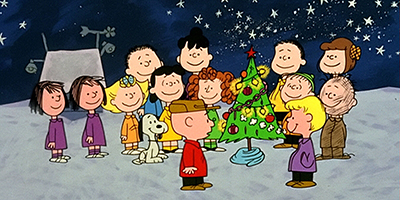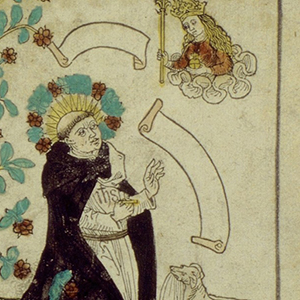Thomas R. Schreiner
James Buchanan Harrison Professor of New Testament
 I would choose Hark the Herald Angels Sing. The carol bursts with joy, which is fitting at our Savior’s birth. We also see why Jesus came: “God and sinners reconciled.” The truth of the incarnation is wonderfully communicated.
I would choose Hark the Herald Angels Sing. The carol bursts with joy, which is fitting at our Savior’s birth. We also see why Jesus came: “God and sinners reconciled.” The truth of the incarnation is wonderfully communicated.
Hershael W. York
Victor and Louise Lester Professor of Christian Preaching
 However commercial the Christmas season grows, whatever waves of cultural ignorance or resentment threaten to overwhelm and flood its historical and theological moorings, I always count on Hark the Herald Angels Sing as an anchor of biblical and beautiful truth. In a department store or a mall, in a restaurant or a party, when I hear Mendelssohn’s tune or Charles Wesley’s lyrics, I thank God that he gets the praise due him even from some who do not know him. The first verse begins innocuously enough with angels singing—who could possibly object to singing angels?—but immediately dives into the deepest truths of the incarnation and its divine purpose. The preincarnate Christ willingly lays aside his glory so that God might reconcile sinners to himself! The truth that enraged a paranoid Herod, that the baby of Bethlehem is born King of the Jews, is now sung by school choirs, at office parties, and in the perennial “A Charlie Brown Christmas.” What a glorious reminder of the gospel, that the newborn King, offspring of a Virgin’s womb, was born that man no more may die.
However commercial the Christmas season grows, whatever waves of cultural ignorance or resentment threaten to overwhelm and flood its historical and theological moorings, I always count on Hark the Herald Angels Sing as an anchor of biblical and beautiful truth. In a department store or a mall, in a restaurant or a party, when I hear Mendelssohn’s tune or Charles Wesley’s lyrics, I thank God that he gets the praise due him even from some who do not know him. The first verse begins innocuously enough with angels singing—who could possibly object to singing angels?—but immediately dives into the deepest truths of the incarnation and its divine purpose. The preincarnate Christ willingly lays aside his glory so that God might reconcile sinners to himself! The truth that enraged a paranoid Herod, that the baby of Bethlehem is born King of the Jews, is now sung by school choirs, at office parties, and in the perennial “A Charlie Brown Christmas.” What a glorious reminder of the gospel, that the newborn King, offspring of a Virgin’s womb, was born that man no more may die.
Matthew J. Hall
Dean of Boyce College
 I don’t have a singular favorite, but one I do particularly love is O Come, O Come, Emmanuel. Every advent season, it aids me in recapturing the wonder of Christian anticipation. It reminds me of the glorious good news that in Christ, God has made his dwelling among men. What grace to know and see what Old Testament saints for centuries anticipated and awaited. And yet, the hymn reminds us that the Christian is still someone who awaits and longs for a future coming of the King and his eternal city.
I don’t have a singular favorite, but one I do particularly love is O Come, O Come, Emmanuel. Every advent season, it aids me in recapturing the wonder of Christian anticipation. It reminds me of the glorious good news that in Christ, God has made his dwelling among men. What grace to know and see what Old Testament saints for centuries anticipated and awaited. And yet, the hymn reminds us that the Christian is still someone who awaits and longs for a future coming of the King and his eternal city.
Tyler Flatt
Assistant Professor of Humanities at Boyce College
 My favorite carol is In Dulci Jubilo, composed probably in the 14th century. It was originally written in alternating lines of Latin and German, but Robert Pearsall’s English translation of the German lines has proved the most popular version since the 19th century. It is widely believed — though no one is sure — that the third verse was added by Martin Luther in the 1530s. The tune, which was later used for Good Christian Men Rejoice, is at least as old as the original words, and perhaps older. For me, the carol’s antiquity, melodic beauty, and verbal simplicity make it uniquely precious. It brings to my mind’s eye snow falling in a medieval churchyard. I hear the bells of heaven (mentioned in the fourth verse) ringing in joy and triumph, no longer marking the dreary passing of the hours but heralding the One who makes all things new. It helps me feel connected to the love, hope, and faith of countless generations of believers who have trusted in Christ before me, and that is no small thing in this 21st century.
My favorite carol is In Dulci Jubilo, composed probably in the 14th century. It was originally written in alternating lines of Latin and German, but Robert Pearsall’s English translation of the German lines has proved the most popular version since the 19th century. It is widely believed — though no one is sure — that the third verse was added by Martin Luther in the 1530s. The tune, which was later used for Good Christian Men Rejoice, is at least as old as the original words, and perhaps older. For me, the carol’s antiquity, melodic beauty, and verbal simplicity make it uniquely precious. It brings to my mind’s eye snow falling in a medieval churchyard. I hear the bells of heaven (mentioned in the fourth verse) ringing in joy and triumph, no longer marking the dreary passing of the hours but heralding the One who makes all things new. It helps me feel connected to the love, hope, and faith of countless generations of believers who have trusted in Christ before me, and that is no small thing in this 21st century.
Jarvis J. Williams
Associate Professor of New Testament Interpretation
O Holy Night. This carol emphasizes the life-changing and earth-shaking historical event of the incarnation, without which there would be no cross or resurrection.

Melissa Tucker
Assistant Professor of Teacher Ed; Chair, Department of Education
Silent Night is my favorite Christmas Hymn. During the holidays, as I was growing up my mom and dad would sing that song as we put up the tree or worked around the house. One day a long time ago, I heard my dad speak on this hymn in church and he reminded us that he loves this hymn because it reminds us to keep silent and allow the Lord to talk to us and work through us.




